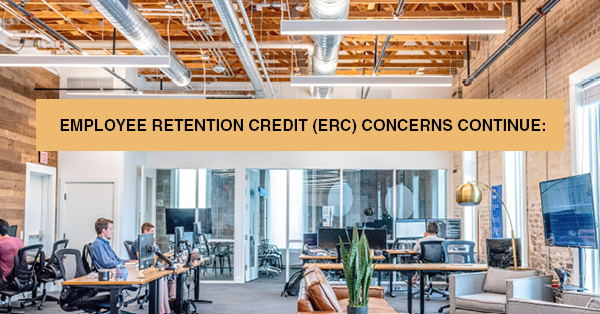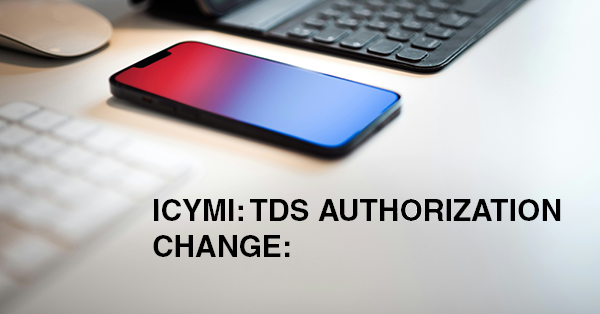EMPLOYEE RETENTION CREDIT (ERC) CONCERNS CONTINUE:

Note from the Editor: During the recent IRS National Tax Forum in Atlanta, Commissioner Werfel sat with a small group of stakeholders to hear concerns regarding the ongoing challenges with the ERC. The NSTP was represented by your editor, Nina Tross, and NSTP member, Tarryn Sampson.
Werfel told a group of tax professionals dealing with fall-out from aggressive ERC claims that the IRS has increased audit and criminal investigation work on these claims, both on the promoters as well as those businesses filing dubious claims.
“The further we get from the pandemic, we believe the percentage of legitimate claims coming in is declining,” Werfel told attendees at the IRS Nationwide Tax Forum in Atlanta. “Instead, we continue to see more and more questionable claims coming in following the onslaught of misleading marketing from promoters pushing businesses to apply. To address this, the IRS continues to intensify our compliance work in this area.”
“Hard-working tax professionals who play by the rules see their clients go elsewhere, lured by false promises and wild exaggerations,” Werfel added. “The resulting number of claims prevents the IRS from doing other priority work. But the biggest risk is being taken by the promoters pushing these schemes and businesses filing these claims. This is an area where we urge caution; those improperly claiming the credit could face follow-up action from the IRS.”
Attendees addressed the OPR decision which we included in the last Tax Tidbit (a portion of which follows:
“For purposes of exercising due diligence, section 10.34(d) allows a practitioner to generally rely in good faith and without verification, on information from the client. Good-faith reliance however, contemplates that a practitioner will make reasonable inquiries of a client to confirm eligibility for the ERC and to determine the correct amount of the credit. A practitioner may accept the clients responses at face value if it is reasonable. But a practitioner may not ignore the implications of information the practitioner knows or has received from the client, If the information from the client appears to be incorrect, incomplete or inconsistent with other facts the practitioner knows, the practitioner cannot simply accept the client's information but must make further inquiries of the client to reconcile the incomplete, incorrect, or inconsistent facts.
If the practitioner cannot reasonably conclude (consistent with the standards discussed in this guidance) that the client is or was eligible to claim the ERC, then the practitioner should not prepare an original or amended return that claims or perpetuates a potentially improper credit.
Additionally, if a practitioner learns that a current client did not comply with the ERC requirements in a prior tax year, the practitioner must, under section 10.21, promptly inform the client of the noncompliance, error, or omission and any penalty or penalties that may apply.”
Taxpayers will be seeing Form 1099-INT from the IRS for the interest earned on the refund of the ERC funds from the amended returns filed for the 2020 and 2021 Form 941-X. It was agreed that the interest income would be reported in the year received by the taxpayer.
The Service has included new FAQs addressing the issue of eligibility, supply chain disruptions, and ERC scams (FAQs follow).
ERC scams
Q1. How do I know if I'm being scammed by an ERC promoter? (updated July 28, 2023)
A1. Scam promoters use several different tactics to mislead people who have no chance of meeting the requirements for the Employee Retention Credit while charging them excessive fees – often thousands of dollars.
Warning signs of aggressive ERC marketing to watch out for:
- Unsolicited calls or advertisements mentioning an "easy application process," or offering a short eligibility checklist.
- Statements that the promoter or company can determine ERC eligibility within minutes.
- Large upfront fees to claim the credit.
- Fees based on a percentage of the refund amount of Employee Retention Credit claimed. This is a similar warning sign for average taxpayers, who should always avoid a tax preparer basing their fee on the size of the refund.
- Preparers refusing to sign the ERC return being filed by the business, exposing just the taxpayer claiming the credit to risk.
- Aggressive claims from the promoter that the business receiving the solicitation qualifies before any discussion of the group's tax situation. In reality, the Employee Retention Credit is a complex credit that requires careful review before applying.
- The IRS also sees wildly aggressive suggestions from marketers urging businesses to submit the claim because there is nothing to lose. In reality, those improperly receiving the credit could have to repay the credit – along with substantial interest and penalties.
Unscrupulous promoters may lie about eligibility requirements, including refusing to provide detailed documents supporting their computations of the ERC. In addition, those using these companies could be at risk of someone using the credit as a ploy to steal the taxpayer's identity or take a cut of the taxpayer's improperly claimed credit.
The IRS continues to see a variety of ways that promoters can lure businesses, tax-exempt groups and others into applying for the credit.
- Aggressive marketing. This can be seen in countless places, including radio, television and online as well as phone calls and text messages.
- Direct mailing. Some ERC mills are sending out fake letters to taxpayers from the non-existent groups like the "Department of Employee Retention Credit." These letters can be made to look like official IRS correspondence or an official government mailing with language urging immediate action.
- Leaving out key details. Third-party promoters of the ERC often don't accurately explain eligibility requirements or how the credit is computed. They may make broad arguments suggesting that all employers are eligible without evaluating an employer's individual circumstances.
- For example, only recovery startup businesses are eligible for the ERC in the fourth quarter of 2021, but promoters fail to explain this limit.
- Also, the promoters may not inform taxpayers that they need to reduce wage deductions claimed on their business' federal income tax return by the amount of the Employee Retention Credit. This causes a domino effect of tax problems for the business.
- Payroll Protection Program participation. In addition, many of these promoters don't tell employers that they can't claim the ERC on wages that were reported as payroll costs to obtain Paycheck Protection Program loan forgiveness.
Q2. How can I protect myself from ERC scam promoters? (updated July 28, 2023)
A2. The IRS reminds businesses, tax-exempt groups and others being approached by these promoters that they can take simple steps to protect themselves from making an improper Employee Retention Credit claim.
- Work with a trusted tax professional. Eligible employers who need help claiming the credit should work with a trusted tax professional; the IRS urges people not to rely on the advice of those soliciting these credits. Promoters who are marketing this ultimately have a vested interest in making money; in many cases they are not looking out for the best interests of those applying.
- Request a detailed worksheet explaining ERC eligibility and the computations used to determine the ERC amount.
- Don't accept a generic document about a government order from a third party. If they say you qualify for ERC based on a government order, ask for a copy of the government order. Review it carefully to make sure it applied to your business or organization.
- Don't apply unless you believe you are legitimately qualified for this credit. Details about the credit are available on IRS.gov, and again a trusted tax professional – not someone promoting the credit – can provide critical professional advice on the ERC.
For more information on warning signs of ERC scams and how to report fraud, see the Employee Retention Credit page.
During a recent House Ways and Means Oversight Subcommittee meeting, Rep. Brian Fitzpatrick, R-Pennsylvania, said his office has been inundated with complaints from constituents about delays in receiving their tax refunds from the IRS.
"The volume of casework that my office has received on the ERTC issue since January alone has been mind-boggling," he said. "The inquiries my office submitted were on behalf of a whole range of organizations, including veterans’ organizations, small businesses, senior homes, just to name a few. One of my constituents was owed almost $300,000 and needed it immediately in order to keep their business doors open. Another constituent had difficulty getting the IRS to even confirm that they have received their application. Lastly, my office received in one instance a complaint from a constituent who had applied for the ERTC for the years 2020 and 2021, but never received the credit until the end of 2022. Most small businesses do not have the luxury of time when it comes to these issues."




